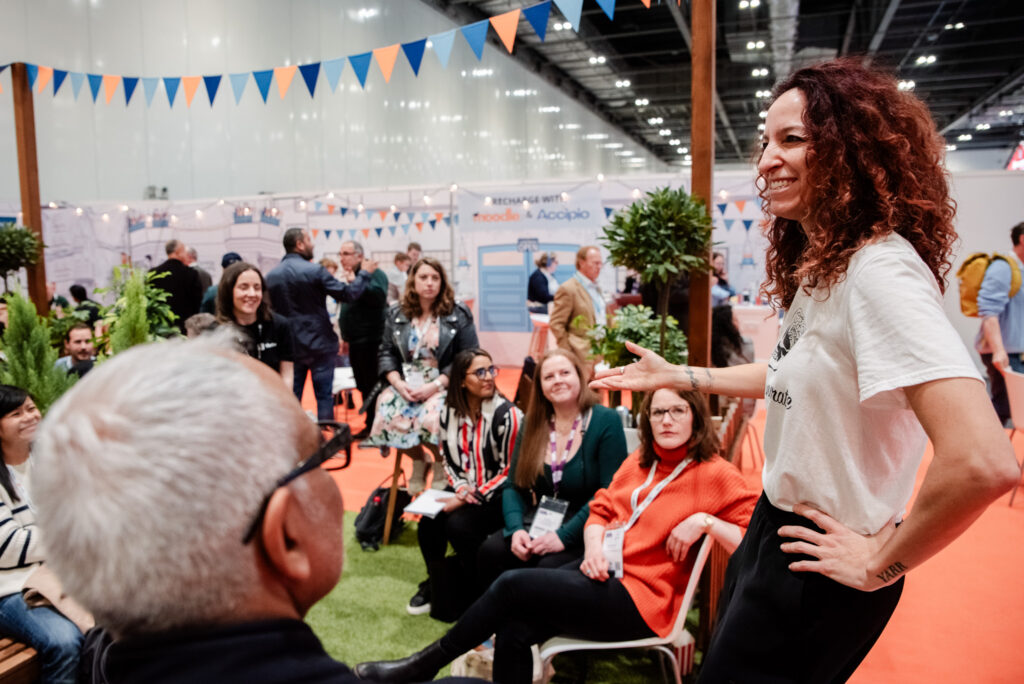As a media partner for Learning Technologies 2024, the TrainingZone team was excited to attend the conference on its 25th anniversary. What did we learn? What were the key takeaways?
Yes, there was a lot of AI chat. But the red thread running through the sessions and sideline conversations were more human-focused: No matter the challenges we’re grappling with, be they preparing workers for an AI world, business-aligned learning or enabling a lifelong learning culture, we must connect, collaborate and co-create.
This is not just among the L&D team, it’s about stepping outside of our comfort zone – or as Founder of Learning Changemakers Laura Overton put it, getting down from our ‘ivory tower’ – and getting into other departments to work interdependently on a common goal. “We need different minds coming together to create a new fresh idea on a thing that matters to all,” Overton said in her session on co-creating business value.
Get down and dirty
Through the lens of learning strategy, Co-Presenter of Learning Now TV Nigel Paine urged L&D to “Get down and dirty.” He was not referring to skullduggery here, but insisting we become “fieldworkers” within our organisations. Getting in among different teams to absorb the varying “pockets of resistance” – the “dialects, discourses and collusions” – to get a grip on the challenges our businesses face.
And when looking for solutions to these stressors, again the answer lies in the collective. Paine recommended we create space for, and be part of, a joined-up thinking process with key stakeholders from across the organisation.
Building on this Dr Celine Mullins, chair of the session, invited us to lean on a common technique upheld in improv comedy, in which improvisers build up a scene together by filling their exchanges with ‘Yes, ands…’. When someone puts forward their ideas, we should seek to develop them rather than shun them, to fill the space with ‘Yes ands…’, rather than ‘no, buts…’.
Indeed, the most complex of problems can only be solved with this collective approach, only with ‘Yes ands…’ Paine said.
AI and the future of work
Speaking of complex problems, let’s turn to the issue of AI and the future of work. The opening keynote by Dr David Susskind, Economist at King’s College London and Oxford University, set the tone and influenced the conversation for the rest of the conference.
In essence, he reminded us that humans cannot fathom what the future holds. During the first wave of AI in the 1980s, researchers believed that building a system better than humans required capturing how a human expert would approach the task and translating this into a set of rules for a machine to follow.
These researchers would never have believed it possible that in 1996 IBM’s deep blue would beat chess champion Garry Kasparov at the game, Susskind remarked. Their limiting beliefs about AI meant they could not see its full potential. They could not foresee the explosive increase in computing power and data storage capacity alongside smart algorithm design that led to AI being built in a “fundamentally different way”.
We must remind ourselves of this lesson as we look to the future. We cannot accurately predict, but we must still prepare. “Yes and…” do so collaboratively.
Mass redeployment not mass re-employment
Susskind suggested that our preparation need not focus on (as headline news might suggest) mass unemployment. When it comes to white-collar work in particular, AI will not ‘take our jobs’ but will take a proportion of our tasks. This means we’ll need to build and adapt our skillsets, redesign career pathways and embrace lifelong learning with a business-as-usual mindset.
In conversation with learning consultant Lior Locher after the keynote, they suggested that just as we might prioritise exercise a few times a week to stay physically healthy, we could also prioritise learning to stay ‘career healthy’– to protect and prepare for the future we cannot fathom.
Take lifelong learning seriously
Of course, it’s not as simple as permitting workers to go ahead and exercise that learning muscle.
At the state level, there’s a need for more resources, investment and thinking being put into mid-life and later-life retraining. Susskind believes that in an AI world, this should be taken as seriously as the development we embark on as children and young adults.
At the organisational level, Detlef Holdoff’s session on self-directed learning also highlighted the many barriers imposed by both the individual and the business prohibiting our ongoing development. L&D teams are responsible for designing an ecosystem that empowers and enables a culture of lifelong learning. Nick van Damm’s ‘Seven elements of a lifelong learning mindset’ is a particularly helpful model Holdoff recommended for this venture.
Final thoughts on Learning Technologies
To round up, Learning Technologies this year sought to open up space for L&D professionals grappling with heavyweight problems: How can we prepare for the path AI development is forging for us? How can L&D devise a strategy that confronts real organisational problems? How can we make L&D itself more inclusive in a world that seems to, sadly, be slipping backwards? (#WomeninLearning).
The conference was not about providing the solution, but rather providing an environment for helpful debate, human connection and co-creating ideas. Components we need to embed more deeply within our organisations as we try to make sense of, and prepare for, the future.
As Chair Donald H Taylor remarked in his opening address “It’s almost impossible to think where we’ll be in 10 years’ time. But we can try.”





